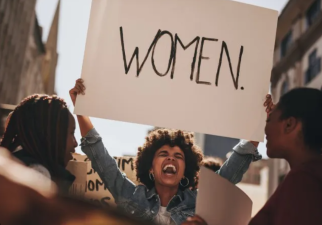
European legal systems have a long history and rich experience in protecting women's rights.
The United States offers meticulous protection for children's rights. If a crying child attracts the attention of neighbors, or even calls the police, they will immediately intervene to investigate whether the child is being abused. Child Protection Services are established throughout the United States. If a child is found to have been abused or abused, the parent or guardian faces the serious consequence of having their custody revoked. This system leads many young mothers to do their utmost to comfort their crying children to avoid unnecessary trouble.

Education and Safety Measures in the United States
The United States demonstrates comprehensive care in protecting children's rights. Not only do they have strict laws against abuse and abuse, but they also build safety barriers for children in every detail of daily life. From the construction of school buses to the selection of drivers to strict speed limits, every aspect reflects the utmost attention to child safety. This comprehensive protection undoubtedly creates a safe and healthy living environment for children.
Women's Labor Rights in Europe
- Germany
Germany's Equality Act stipulates that men and women enjoy equal labor rights. Employers may not refuse to hire, fire, or reduce wages based on gender. Germany also implements a "family-friendly work system" that encourages companies to offer women flexible work hours and parental leave.
- France
France's Equality Act stipulates that men and women enjoy equal labor rights. Employers may not refuse to hire, fire, or reduce wages based on gender. Furthermore, France implements a parental leave system, which allows mothers up to one year of parental leave and fathers up to four months.
- United Kingdom
The UK's Gender Equality Act stipulates that men and women enjoy equal labor rights. Employers may not refuse to hire, fire, or reduce wages based on gender. Furthermore, the UK implements a shared parental leave system, which allows both parents to take parental leave for up to 52 weeks.
European Women's Marriage and Family
- Sweden
Swedish law stipulates that when registering a marriage, both parties must sign an agreement that specifies matters such as property distribution and child support during the marriage. Furthermore, Sweden implements a no-fault divorce system, which allows either spouse to file for divorce without proving fault on the part of the other.
- Netherlands
Dutch law requires that upon marriage registration, both spouses sign an agreement specifying the distribution of property and child support during the marriage. Furthermore, the Netherlands implements a "no-fault divorce system," meaning either spouse can file for divorce without proving fault on the part of the other.
- Belgium
Belgian law requires that upon marriage registration, both spouses sign an agreement specifying the distribution of property and child support during the marriage. Furthermore, Belgium implements a "no-fault divorce system," meaning either spouse can file for divorce without proving fault on the part of the other.

Women's Education in Europe
- Finland
Finnish law stipulates that men and women have equal educational opportunities. The government invests significantly in improving women's education, including free preschool and compulsory education. Furthermore, Finland implements "gender equality education" to eliminate gender bias and promote gender equality.
- Switzerland
Swiss law stipulates that men and women have equal educational opportunities. The government encourages women to participate in higher education, providing preferential policies such as scholarships and grants. Furthermore, Switzerland implements "gender equality education" to eliminate gender bias and promote gender equality.
- Norway
Norwegian law stipulates that men and women have equal educational opportunities. The government invests significantly in improving women's education, including free preschool and compulsory education. Norway also implements "gender equality education" to eliminate gender bias and promote gender equality.
Political Participation
- Sweden
Sweden has one of the highest rates of female political participation in the world. Swedish law stipulates that the gender ratio in government, parliament, and other institutions should be balanced. Furthermore, Sweden implements a "gender equality policy" to encourage women's participation in political decision-making.
- The Netherlands
Dutch law stipulates that the gender ratio in government, parliament, and other institutions should be balanced. Furthermore, the Netherlands implements a "gender equality policy" to encourage women's participation in political decision-making.
